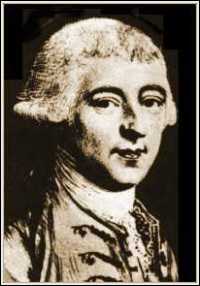 One of the most aristocratic delegates at the convention, Butler was born in 1744 in County
Carlow, Ireland. His father was Sir Richard Butler, member of Parliament and a baronet.
One of the most aristocratic delegates at the convention, Butler was born in 1744 in County
Carlow, Ireland. His father was Sir Richard Butler, member of Parliament and a baronet.
*** Quote ***
 One of the most aristocratic delegates at the convention, Butler was born in 1744 in County
Carlow, Ireland. His father was Sir Richard Butler, member of Parliament and a baronet.
One of the most aristocratic delegates at the convention, Butler was born in 1744 in County
Carlow, Ireland. His father was Sir Richard Butler, member of Parliament and a baronet.
Like so many younger sons of the British aristocracy who could not inherit their fathers' estates because of primogeniture, Butler pursued a military career. He became a major in His Majesty's 29th Regiment and during the colonial unrest was posted to Boston in 1768 to quell disturbances there. In 1771 he married Mary Middleton, daughter of a wealthy South Carolinian, and before long resigned his commission to take up a planter's life in the Charleston area. The couple was to have at least one daughter.
When the Revolution broke out, Butler took up the Whig cause. He was elected to the assembly in 1778, and the next year he served as adjutant general in the South Carolina militia. While in the legislature through most of the 1780s, he took over leadership of the democratic upcountry faction in the state and refused to support his own planter group. The War for Independence cost him much of his property, and his finances were so precarious for a time that he was forced to travel to Amsterdam to seek a personal loan. In 1786 the assembly appointed him to a commission charged with settling a state boundary dispute.
The next year, Butler won election to both the Continental Congress (1787-88) and the Constitutional Convention. In the latter assembly, he was an outspoken nationalist who attended practically every session and was a key spokesman for the Madison-Wilson caucus. Butler also supported the interests of southern slaveholders. He served on the Committee on Postponed Matters.
On his return to South Carolina Butler defended the Constitution but did not participate in the ratifying convention. Service in the U.S. Senate (1789-96) followed. Although nominally a Federalist, he often crossed party lines. He supported Hamilton's fiscal program but opposed Jay's Treaty and Federalist judiciary and tariff measures.
Out of the Senate and back in South Carolina from 1797 to 1802, Butler was considered for but did not attain the governorship. He sat briefly in the Senate again in 1803-4 to fill out an unexpired term, and he once again demonstrated party independence. But, for the most part, his later career was spent as a wealthy planter. In his last years, he moved to Philadelphia, apparently to be near a daughter who had married a local physician. Butler died there in 1822 at the age of 77 and was buried in the yard of Christ Church.